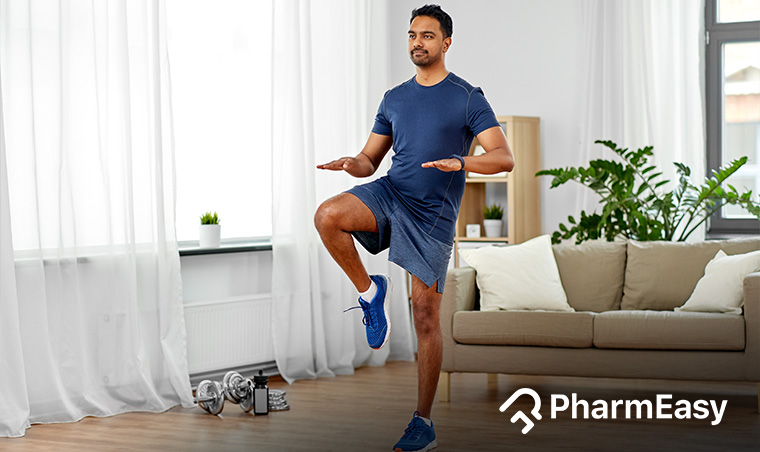How Can Physical Activities Counter The Negative Health Effects Of Poor Sleep?
By Dr. Nikita Toshi +2 more

Get,

to manage your symptom
Get your,


4 Cr+ families
benefitted

OTP sent to 9988776655



You’ve successfully subscribed to receive
doctor-approved tips on
Whatsapp

Get ready to feel your best.

Hi There,



Register to Avail the Offer
Send OTPBy continuing, you agree with our Privacy Policy and Terms and Conditions

Hi There,

Trusted by 4 crore+ families

OTP sent to 9988776655



You have unlocked 25% off on medicines




Code: NU25

By Dr. Nikita Toshi +2 more
Sleep is a vital aspect of our health, both physical and mental. Inferior quality of sleep and lack of physical activity have independent negative implications on our health. An extensive study from the British Journal of Sports Medicine has shown that high levels of physical activity can help counter the negative effects of sleep deprivation. So how are physical activity and sleep-related?

Table of Contents
The association between sleep and physical activity has been done with the help of the study of around 380,000 middle-aged men and women. The study conclusively showed that the participants who slept least were at risk to contract heart diseases. Participants who had poor or moderate levels of physical activity coupled with low quality of sleep were found to be at an even higher risk level for contracting cardiovascular diseases.
Healthy sleeping periods already resulted in healthier cardiovascular conditions and better functioning of the body. Moderate to high levels of physical activity and healthy sleep levels resulted in the best health conditions for people.
What was a new finding from the research was that high levels of physical activities (which refers to 1200 or more Metabolic Equivalent Minutes per week), can help in reducing the risk of diseases related to low levels of sleep. Thus even if you are missing out on sleep due to a heavy workload, maintaining a healthy level of physical activity can help you reduce the risks to your health. Moreover, a regular exercise routine can also improve the quality of sleep.
Regular exercise can help healthy adults sleep better. While acute physical activity can have a small effect on sleep quality and duration, regular, moderate exercise can extend sleep duration, improve sleep quality, and decrease sleep onset, or the time it takes to fall asleep
Dr. M.G. Kartheeka, MBBS, MD
Cardiovascular diseases, high blood pressure and obesity are just some of the physical inactivity risks to our bodies. You can easily avoid any complications by including these simple but effective physical activities into your daily routine:
Some tips to help one sleep peacefully include- keeping a regular routine, keeping technology at bay when in bed, relaxing with a warm bath, or light music before sleep, and decluttering your mind.
Dr. Ashish Bajaj – M.B.B.S, M.D.
Sleep hygiene refers to a set of habits that can be practised for a better quality of sleep. A sound sleep not only keeps your body healthy but is also great for your mental health. Try following some simple steps in order to sleep better at night:
Lack of physical activity and proper sleep is unhealthy for the body. Incorporating a good sleep schedule and a physical activity routine is crucial in maintaining your health at an optimal level. Our work and other responsibilities often lead to a lack of proper sleep. If such is the case, do try and include a high level of physical activity in your routine, as it can help you reduce the negative effects of sleep deprivation. A healthy diet should also be followed if you really want to see the effects of a good sleep schedule and an active lifestyle.
Disclaimer: The information provided here is for educational/awareness purposes only and is not intended to be a substitute for medical treatment by a healthcare professional and should not be relied upon to diagnose or treat any medical condition. The reader should consult a registered medical practitioner to determine the appropriateness of the information and before consuming any medication. PharmEasy does not provide any guarantee or warranty (express or implied) regarding the accuracy, adequacy, completeness, legality, reliability or usefulness of the information; and disclaims any liability arising thereof.
Links and product recommendations in the information provided here are advertisements of third-party products available on the website. PharmEasy does not make any representation on the accuracy or suitability of such products/services. Advertisements do not influence the editorial decisions or content. The information in this blog is subject to change without notice. The authors and administrators reserve the right to modify, add, or remove content without notification. It is your responsibility to review this disclaimer regularly for any changes.

Leave your comment...
Comments